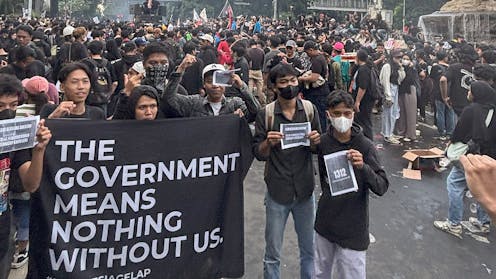After Charlie Kirk’s murder, the US might seem hopelessly divided – is there any way forward?
- Written by Lee Bebout, Professor of English, Arizona State University

Shortly following the fatal shooting of conservative activist Charlie Kirk, many politicians and pundits were quick to highlight the importance of civil discourse.
Utah Gov. Spencer Cox called for an “off-ramp[1]” to political hostilities, while California Gov. Gavin Newsom released a statement[2] condemning political violence. He lauded Kirk’s “commitment to debate,” adding, “The best way to honor Charlie’s memory is to continue his work: engage with each other, across ideology, through spirited discourse.” Political commentator Ezra Klein wrote[3], “You can dislike much of what Kirk believed and the following statement is still true: Kirk was practicing politics in exactly the right way.”
With so many Americans consuming political content via siloed social media feeds[4] and awash in algorithms that stoke outrage[5], these ideals may seem quaint, if not impossible.
Clearly, murder is a no-go. But what does it mean to practice politics “the right way?” How can people engage “across ideology” in a “spirited” way?
Well, one way to not practice politics the right way is to limit the other side from having a voice of authority. Since 2016, the organization Kirk co-founded, Turning Point USA, has hosted the Professor Watchlist[6]. The online database generated harassment campaigns against professors, leading to calls for firings, hate mail and death threats. To be sure, the left has not been without its own excesses of harassment[7] in recent years.
Kirk was also known for going to college campuses and speaking to students: entering the lion’s den and affably challenging audiences to “change my mind[8].”
To me, the impulse to shut down the other side, combined with the “change my mind approach” to debate, has only exacerbated political polarization and entrenchment. Instead, I propose a few different ways of thinking about conversations with people whose views differ from your own.
The fantasy of swiftly changing minds
In my forthcoming book, “Rules for Reactionaries: How to Maintain Inequality and Stop Social Justice[9],” I explore the language strategies used to advance white supremacy and anti-feminism across U.S. politics and culture.
Deliberative democracy[10] is the idea that decision-making and governance are arrived at through thoughtful, reasoned and respectful dialogue. This may take the shape of debates in Congress or robust questioning in town halls. But deliberative democracy also shapes the way all neighbors or citizens treat each other, whether on the street or at the dinner table.
I contend that a big stumbling block that prevents the U.S. from tackling its biggest problems is how Americans conceptualize deliberative democracy: There’s a fantasy that people’s minds can be easily changed[11], if only they’re given certain information or hear certain arguments.
In the 1990s, this was epitomized through former President Bill Clinton’s Initiative on Race[12], a program that he framed as a vehicle for social and political transformation. Clinton believed that an advisory board of experts could foster a meaningful national dialogue and produce necessary healing.
In response, conservative political figures objected[13] both to the need for a conversation in the first place and to the makeup of the committee leading it.
By the time Clinton’s second term ended, the initiative quietly disappeared, only to be mentioned in passing in Clinton’s memoir. Yet with each subsequent racial flash point, from the arrest of Henry Louis Gates in 2009 [14] to the murder of George Floyd[15], calls resurfaced for the national conversation. But race remains a politically and culturally salient issue.
Similarly, many Americans view friends, relatives and colleagues as targets for conversion. Because of the nature of my research, I often get a version of this question from my students: “How do you change someone’s mind if they say they’re a socialist?” Or they may frame it as, “I’ve got Thanksgiving with my family coming up, and my Uncle Johnny is so transphobic. How do I convince him to support trans rights?”
Cultural theorist Lauren Berlant would describe these encounters as moments of cruel optimism[16]. There’s the belief that what you’re about to do is good and worthy. But time and again, you’re met with feelings of futility and frustration.
When debating politics, many people crave a chance to engage with someone they disagree with. There’s the hope of changing hearts and minds. But few minds – if any – change that quickly, and approaching these conversations as small windows of opportunity ends up being their downfall.
Opening minds instead of changing them
There are more fruitful approaches to conversation than merely trying to best someone in an argument by deploying buzzwords or “gotcha!” moments.
Rather than trying to immediately change someone’s mind, what if you entered a conversation with the goal of simply planting seeds? This approach transforms the dialogue from an attempted conversion into a legitimate conversation, wherein you’re merely offering your partner something to consider after the fact.
Another strategy involves remembering that conversations often have multiple audiences.
Consider the Thanksgiving dinner with Uncle Johnny. What if, instead of focusing on trying to convert him, the speaker recognized that there were other listeners at the table? Perhaps they could rethink their encounter not as converting an opponent, but as modeling to relatives how to have a conversation about one’s values with a loved one whom they vehemently disagree with. Or perhaps the speaker could recognize that a cousin at the table may be closeted, and take it upon themselves to model how to push back against transphobia.
In both cases, the conversion of Uncle Johnny ceases to be the objective. Civic dialogue and persuasion remain.
Change is slow but never futile
If the U.S. is going to heal its civic life through dialogue, I think it will require Americans to not just speak with those they disagree with, but to listen to them as well.
Krista Ratcliffe[17], a scholar of rhetoric at Arizona State University, has written about her concept of “rhetorical listening[18].” Listeners, she argues, must not simply be attuned to the words a speakers says, but also to the life experiences and ideologies that shape those words.
Rhetorical listening means avoiding the urge to one-up the opponent or convert the unwashed masses. Instead, you’re entering into dialogue from a position of curiosity, with a willingness to learn and grow.
Many people believe that the U.S. is at an inflection point[19]. Will families and friendships continue to be torn apart? Will greater political polarization lead to more violence? Often it feels hopeless.
Like Sisyphus[20], many Americans probably feel like they continue to push a boulder up a hill, only for it to roll down the other side. The error would be for Americans to be surprised when the boulder rolls back down – shocked that there was no progress and that everyone has to start over again.
While the Sisyphean task of deliberative democracy requires that citizens push the boulder day in and day out, they should also recognize that as they push, the weight of the boulder as it’s collectively pushed will gradually and imperceptibly alter the terrain.
Moreover, as the French philosopher Albert Camus once wrote[21], it’s important to “imagine Sisyphus happy” – to continue to seize what joy can be had as this hard work plods along.
References
- ^ off-ramp (www.reuters.com)
- ^ California Gov. Gavin Newsom released a statement (www.gov.ca.gov)
- ^ Political commentator Ezra Klein wrote (www.nytimes.com)
- ^ siloed social media feeds (newsliteracymatters.com)
- ^ algorithms that stoke outrage (www.npr.org)
- ^ the Professor Watchlist (www.thebanner.com)
- ^ its own excesses of harassment (www.thefire.org)
- ^ change my mind (calendar.fsu.edu)
- ^ Rules for Reactionaries: How to Maintain Inequality and Stop Social Justice (nyupress.org)
- ^ Deliberative democracy (www.ebsco.com)
- ^ can be easily changed (www.doi.org)
- ^ Initiative on Race (www.ebsco.com)
- ^ conservative political figures objected (www.cnn.com)
- ^ the arrest of Henry Louis Gates in 2009 (www.nytimes.com)
- ^ the murder of George Floyd (apnews.com)
- ^ as moments of cruel optimism (www.dukeupress.edu)
- ^ Krista Ratcliffe (scholar.google.com)
- ^ rhetorical listening (scholar.google.com)
- ^ the U.S. is at an inflection point (www.aei.org)
- ^ Like Sisyphus (www.greekmyths-greekmythology.com)
- ^ as the French philosopher Albert Camus once wrote (theexaminedlife.org)
Authors: Lee Bebout, Professor of English, Arizona State University




